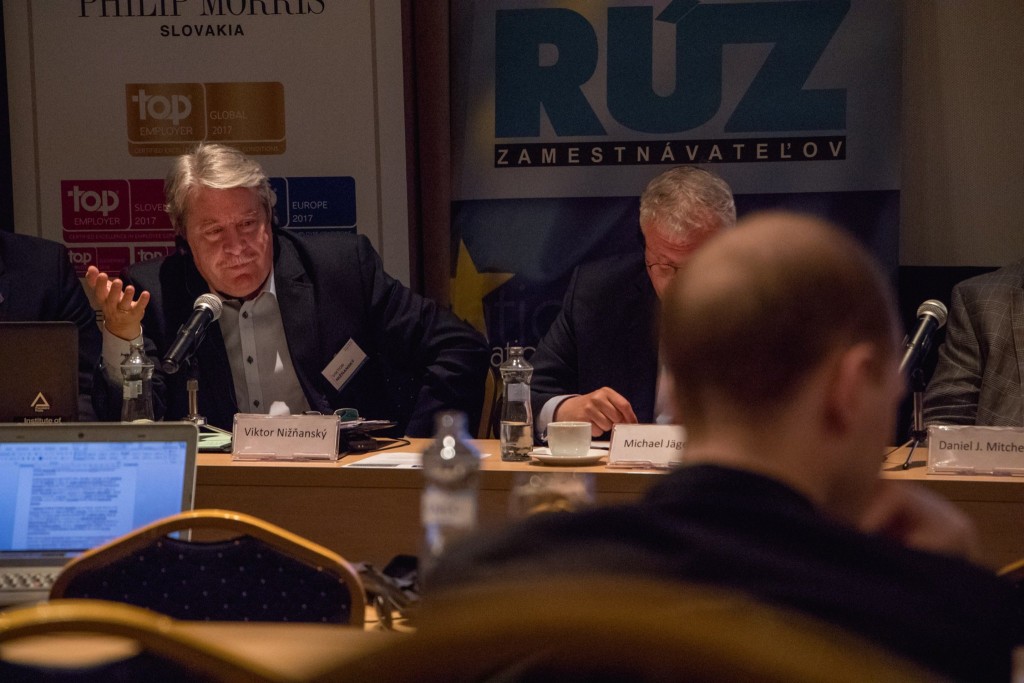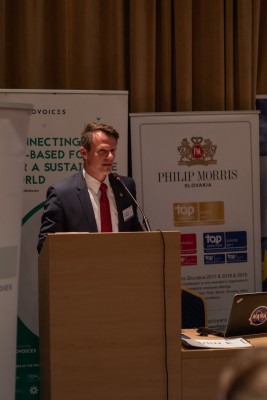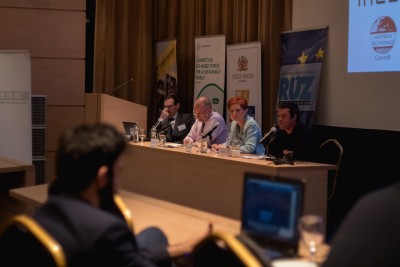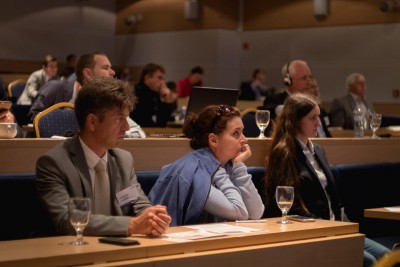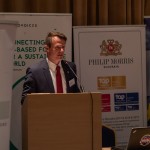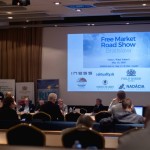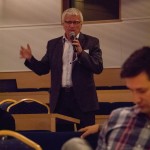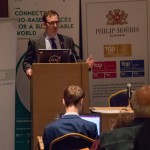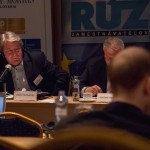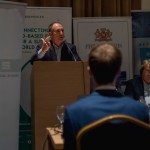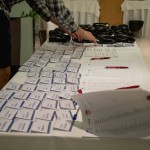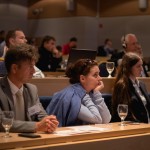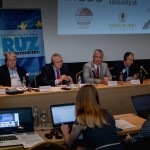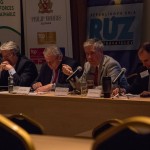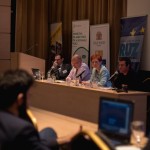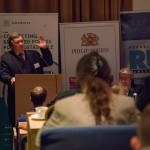INESS has been organizing the Free Market Road Show, an international conference, for a number of years. It is a series of conferences, organized across Europe, from Scandinavia to Montenegro, from Spain to Ukraine. The event found its way to Bratislava in 2018 again and brought topics stirring the public at home and abroad.
The Slovak part of the tour took place on May 14, 2018, in Tatra Hotel in Bratislava with approximately 80 participants. In the audience we welcomed politicians, ambassadors, students, entrepreneurs, journalists and several members of groups of interest and NGOs. This year’s conference was focused on two main topics: values of contemporary society and Slovak agriculture.
The event was set open by Richard Ďurana, the director of INESS. He laid out the conference’s program and underlined the importance and recency of the discussed topics. The first panel discussion dedicated to values followed right after. As a part of it, foreign, as well as Slovak speakers delivered their presentations.
The first speaker to come forward was John Chisholm (USA), a successful venture capitalist, with more than 30 years of business experience. He is the author of the book „Unleash Your Inner Company“, which served as a reference during his speech. He talked about his entrepreneurship beginnings and his experience with the dotcom bubble burst in 2001 which made him cut wages in the company as well as his own by 50% at first, additionally bringing it down to a minimum wage level. According to Chisholm it is necessary to give attention to customers’ needs and link it to passion for a particular sort of business. He concluded his presentation with suggestions for Slovakia on how to simplify entrepreneurship which is a demanding and at the same time virtuous activity even without bureaucracy or high tax burden.
The second speech was delivered by Daniel J. Mitchell (USA), an economist focusing on public policy, who worked in many well-known think-tanks such as The Heritage Foundation or CATO Institute. In his remarks, he took a look at economic freedom as a key element for wealth growth. He began with a claim that Europe is a place for people to live. The reasons for this, according to Mitchell, are especially public affairs administration and well-functioning rule of law. He talked about the wealth growth of European nations in the 18th and 19th century and the welfare state boom that followed in the 1960s. Looking at the economic freedom charts, European countries with high taxes and a strong welfare state score relatively high, mainly due to adherence to governing principles of law and the fact that their „golden age“ in the past had made them significantly rich. The speaker concluded his presentation offering his view on Slovakia as well and he laid out what could be done for better economic freedom and prosperity.
Another presentation by a Slovak speaker Viktor Nižňanský, the author of the public administration reform and the Communal and Research Advisory Center director, followed. He focused on advantages of the decentralized form of public administration, which make materialization of aims and values at the local level easier. The government makes mistakes and one of the forms of flawed decisions’ impact minimization is competition – meaning more powers should be given to the local level so that the whole society does not bear the costs of those bad decisions. Such a decentralized system not only reacts to needs and incentives in society more swiftly and dynamically, but is also a quick learner: the successful policies may be copied by other regions and, by contrast, the harmful ones with negative effect can be avoided.
Richard Zundritsch (AT) is an independent financial expert based in Switzerland with specialization on capital markets. He dedicated his speech to European values and their definition all over the continent. In his remarks he talked about values which serve as pillars for the western civilization and are subject to decay through indifference. Fairness and solidarity are often mentioned as European values but every subject defines these individually.
The next speaker stepped out – Michael Jäger (DE) from Bavarian Taxpayers Association, European Economic Senate and Taxpayers Association of Europe. In his opening remarks he pointed out that values are a result of discussion. If we cannot make decisions on the national level, the EU takes over the power to do so and might make decisions against the will of the citizens. Tax policy was mentioned as a fine example. There is an amendment in the Bavarian constitution that bars the country from becoming indebted, but many European countries execute loose fiscal policies. He mentioned the advantages of tax competition but also stressed out that it is crucial to agree on the desirable regime right in the beginning.
After these individual speeches, a discussion carried on to offer the audience a chance to ask questions. During this discussion, Viktor Nižňanský made it clear that it is unpopular to increase taxes at the local level and for this reason local contributions are low. On the other hand, the citizens lack opportunities to raise money, for instance, for the construction of facilities desirable for them in their municipalities. This creates pressure on spending rationalization, future prospects (a swimming pool is great but who is going to pay for its operations in the future?) and a more reasonable prioritization. At the same time he answered the question about the change in paradigm towards decentralization. He pointed out that it is important to create a platform of friends of decentralization to increase pressure on politicians in their decision making.
One question from the audience was also meant for Dan Mitchell, this time about corruption and how the US has tackled this problem. Mitchell pointed out the fact that many corruption scandals in the US happen on the edge of the law and are considered to be legal. To solve this, he believes limitations of states’ powers and size can effectively prevent such occurrences.
The second panel aimed at an especially hot domestic topic – problems of Slovak agriculture. The discussion was opened by Martin Vlachynský from INESS who was also a moderator later on. In his opening remarks he talked about agriculture as a form of business which had to overcome, apart from common bureaucratic obstacles, numerous other problems as well. Low added value of production per hectare of land or the very problem of ownership and land use were another tricky issues. He mentioned three key factors for improvement of agricultural competitiveness which were a working land market, subsidies system overhaul, and also an inevitable inflow of capital and know-how.
The first guest in the panel was the chair of the European Commission’s Office in Slovakia, Ladislav Miko. In his remarks, he focused on essential problems with the quality of land, especially its troubling chemical composition. He also stressed the fact that there was no political will to solve this issue. He pointed out that subsidies’ distribution is in the hands of the member states.
The second guest in the agricultural panel was a food industry expert Jarmila Halgašová, who is the teamleader for agriculture of Slovak political party Sloboda a Solidarita (Freedom and solidarity) and a former long-term chair of the Food Chamber of Slovakia. In her speech she also talked about low added value of agricultural products – while Slovakia remained stagnant, other nations had been able to double their added value. She criticized political priorities in the field of agriculture where minor issues such as dual quality of food or billboards in market chains were being scrutinized, while crucial structural problems in financing of the sector were left unnoticed.
The third speaker was Erik Baláž, a conservator, a documentarist and a vice-chair of the party SPOLU. He stressed in his speech that the land ownership could be transparent but its use was often a problem. Yard sales of agricultural produce should be made easier to allow the farmers to sell their products legally. He highlighted local products with its specifications as a competitive advantage of Slovakia. In his conclusion, he said that the government should free up space for creative individuals in the regions because it is their work that could truly uplift the regions.
Then, a discussion followed, with Ladislav Miko reacting to a suggestion for liberalization of conditions for yard sales. He brought attention to the fact that in such cases, the customers would have to accept that the government cannot guarantee the food quality and safety. Another problem is, according to Miko, the omission of externalities from the relation between costs and revenues in agriculture. Miko believes that subsidies can be adjusted in order to minimize negative externalities. Halgašová described again the problem of low added value of exported products using the example of oil-seed rape harvested in Slovakia, then exported, only to be imported again, this time as processed products. During the discussion about small and medium farmers, Erik Baláž mentioned that the size of the farm was irrelevant for its quality evaluation. He highlighted the complicated relation between land owners and land users and the fact that many issues could have been solved through liberalization of land use conditions.
We could only organize The Free Marked Road Show 2018 thanks to the kind support of our partners. Co-organizer of the event is the Austrian Economics Center, we also enjoyed support of Tatra Bank Foundation, Philip Morris Slovakia, Biovoices, Republic Union of Enterpreneurs, Slovak Students for Liberty and Aktuality.sk.
Translated by Marek Engeľ
- INESS
- INESS
- INESS



